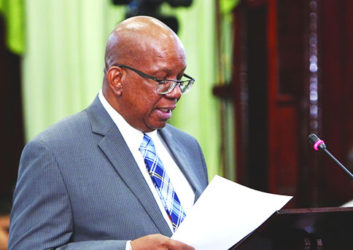Changes proposed for the Value-Added Tax (VAT) system are necessary to strengthen a revenue source which had been weakened by the excessive granting of tax exemptions, waivers and concessions under the former People’s Progressive Party Civic (PPP/C) government, Minister of Finance Winston Jordan said yesterday.
During his two-hour presentation to close the five-day budget debate, Jordan told the National Assembly yesterday that the new tax measures included in the proposed $250B national budget for 2017 were crafted after two reviews of Guyana’s tax system recommended that measures, such as a VAT charge on high consumption of water and electricity, should be implemented.
The reception for Jordan’s announcement of the reduction of the 16% VAT has been blunted by stiff opposition to announced plans to apply the tax to water and electricity consumption above certain levels. There has also been severe criticism of proposed taxation on key services.
Jordan argued that the APNU+AFC coalition had promised in its manifesto not just a reduction in VAT but “more particularly to undertake comprehensive tax reform,” which the budget has delivered on.

He also challenged the assertion made by the parliamentary opposition that the early budget was prepared hastily and that stakeholders’ consultations were poorly attended.
According to Jordan, the opposition was invited to the consultations but chose not to attend and then entered the House and behaved like a wayward child throwing a tantrum. He also noted that the Private Sector Commission, which has been very critical of the budget policies, failed to attend two scheduled meetings but did submit a written memorandum which was considered.
The minister, however, noted that he had warned the private sector since last year that he would not be giving any concessions.
“Like prices, concessions are sticky; once given it is difficult to take it back. Don’t come to me for concession. Concessions have sectional interest. It got all kind of interest. I believe we must lower taxes so that all can benefit. I prefer a tax code that is uniform and uniformly applied,” he told the House.
Jordan explained that while many come to his office with long wish lists at budget time, they are nothing more than a wish lists since none of these wish lists are accompanied by conclusive analysis or any detail about the benefits of these concessions to the economy or the people.
“If I give this concession, how much more jobs will you be able to add, how much more taxes will you pay. How much will the government lose?” he asked.
He later supported these observations by quoting the report from the Tax Reform Committee, which was set up by his government in 2015. This committee found that tax revenue, as a share of Gross Domestic Product (GDP), had not risen very appreciably in recent decades, a failure which was attributed to excessive granting of tax exemptions, waivers and concessions, including VAT zero-rating for most basic commodities. It was, therefore, suggested that such exemptions, waivers and other concessions be rolled back. This recommendation was included in the 2017 budget.
“It should be noted that between 2009 and 2013 the PPP/C government undertook two comprehensive studies on Guyana’s tax system and its administration. Fundamental reforms were proposed in both studies but the recommendations were not implemented. Instead, in 2011, the government undertook major tax policy reversals, when the Fiscal Management and Accountability Act of 2003 was amended to introduce more exemptions and remissions. That ultimately made tax administration difficult and revenue losses significant,” the minister told the house.
He explained that while the last administration approved significant changes in the tax laws, the framework which supported combined high rates and a plethora of concessions and exemptions on a discretionary basis and high levels of evasion across sectors remained intact.
Compensating
The Tax Reform Committee also found that the government was compensating for a relatively high tax rate, and encouraging increased flows of investment through mainly discretionary, insufficiently transparent incentives system, which has gotten out of control and, moreover, there is little evidence of its effectiveness.
Jordan said it argued that a lowering of the corporate tax rate ought to vitiate the need for a plethora of tax incentive.
It further identified a need for the broadening of the tax base so as to both reduce the burden of existing individual and corporate taxpayers and enhance the revenue contribution of the “hard-to-tax” self-employed, the significant number of unincorporated businesses which pay little or no tax, and those who make up a relatively large informal sector.
“Evidence disclosed the VAT was not being applied across the country; was widely ignored by significant segments of the economy. There was an appalling level of tax evasion among professionals, with only a handful of doctors, accountants and lawyers reporting income over $10 million, requiring VAT registration,” Jordan disclosed.
He stressed that thought the committee, comprised of Dr. Maurice Odle, Christopher Ram, Dr. Thomas Singh, Godfrey Statia, Dr. Natasha Gaskin-Peters and Debra Roberts recommended several changes to the VAT system, he was still not comfortable with implementing these suggestions as he recognised they would be politically inconvenient.
He therefore invited the Caribbean Regional Technical Assistance Centre (CARTAC) to conduct an analysis. It was this team which found that there had been “marked changes in the architecture of the VAT since its implementation in 2007, yielding negative impacts on its outturn.”
Based on the findings of these two groups, Jordan explained that he took the decision, against the advice of some members of Cabinet, to implement the measures which will take effect in 2017.
He explained that it was the Tax Reform Committee which recommend that the standard rate of VAT be decreased to 14% and that VAT should be applied to consumption levels above that required for an average household as determined by the water and electricity authorities. It was a recommendation similar to that of CARTAC, which called for government to tax all fuels, electricity and water sewerage services at standard rates.
It was the Tax Reform Committee which recommended that government and government agencies should become dutiable on their purchases. CARTAC also recommended that government purchases be taxed at the standard rate and be accompanied with gross of VAT budgeting for the government and all its agencies.
Also recommended by CARTAC was the elimination of all conditional VAT exemptions at Customs; an evaluation of the impact of conditional duty and excise exemptions on VAT collections by Customs; and the suspension of the granting of new VAT incentives through investment agreements until the Ministry of Finance can ascertain their benefits.
Jordan voiced his preference for these recommendations since they would reduce the need for differentiated or special treatment. He further assured the House that these measures and others contained in the budget represent an awakening. “Starting today, our government must become more efficient and effective, doing well the things that only government should do…the people of Guyana can rest assured of one thing: this coalition government remains the only political force that has the vision, the compassion, the philosophical conviction, the plan and the cohesive team and the talent needed to bring the Good Life to all our people,” Jordan said.










